Girard-Perregaux Traveller WW.TC Reviewed
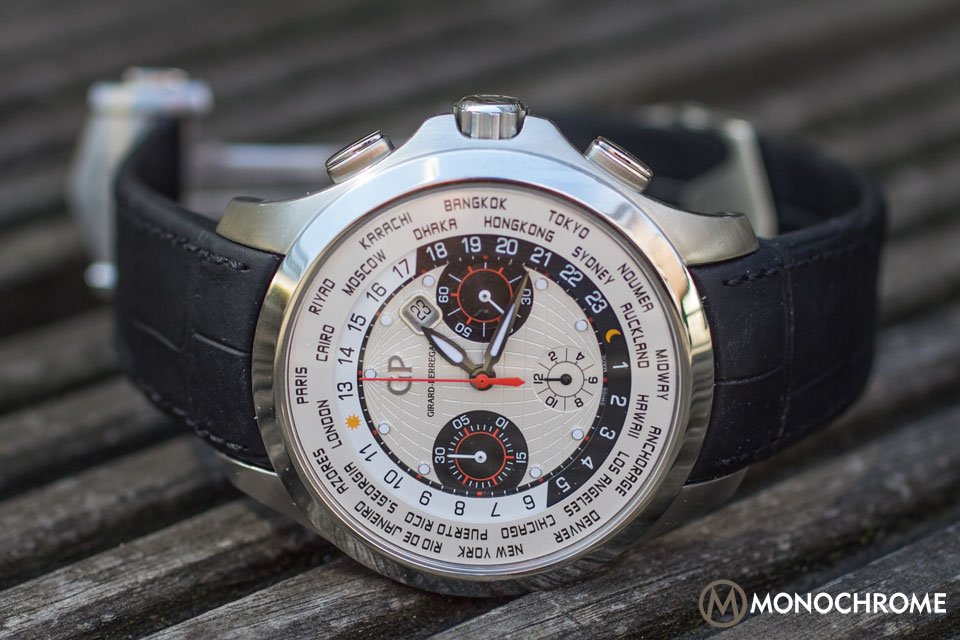
Shortly before Baselworld 2013 started, Girard-Perregaux introduced the new Traveller collection. This collection comprises the new Traveller Moon Phases and Large Date (what’s in a name) and the well-known WW.TC. The latter has been renamed to Traveler WW.TC (click here for the introduction). Maybe well-known, but the WW.TC is entirely re-designed and by that we mean not just a different dial color. With an entirely new case the Traveller WW.TC gains in usability and ergonomics. And visually it remains a very pleasing all-round office/leisure watch.
Ever since Girard-Perregaux introduced the WW.TC – the name stands for World Wide Time Control – it has been a very successful model with a distinct design. It always featured a second crown, placed on the left side of the case, that served to rotate the worldtimer’s city disk. With the arrival of the new Traveller WW.TC, the essence of the WW.TC remains, however the recognizable crown on the left side has disappeared. Now all functions, except start/stop/reset of the chronograph, can be operated through one crown.
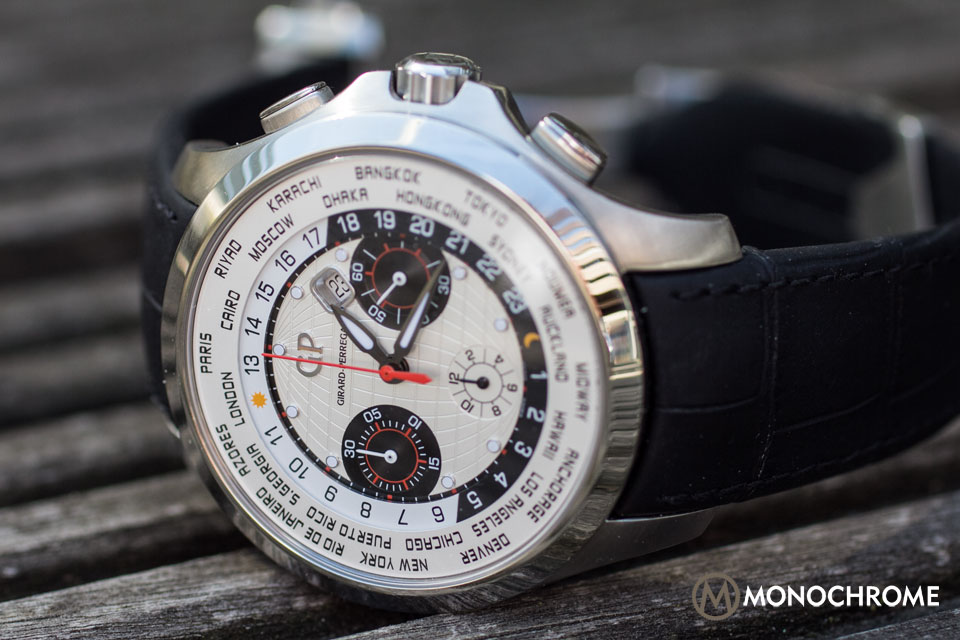
History
Worldtimers
Before the world was divided into time zones, as we know them today, there were hundreds of local times and they were more or less officially recognised. You can imagine that it’s difficult to schedule an appointment, because you always had to confirm not only at what time the appointment was, but also in which time. When traveling to another place, with its own time, you needed to be aware of that as well. The problems caused by all the different local times only got bigger when trade and transportation were undergoing rapid expansion. Think of the necessity of a proper railway schedule and having to use multiple “official” times along the track. Nearly impossible.
In the 1870’s, the engineer Sandford Fleming proposed a system for dividing the world into twenty-four time zones, each one covering 15° of longitude and corresponding to one hour, with Greenwich as the prime meridian. This concept, which was only adopted progressively around the world, was accepted by an international meridian conference in 1884.
To show the time in several time zones, watch companies created watches with two synchronized movements in one (pocket)watch. Sometimes even more than two movement, so one could keep track of the times in more than two places. In 1930, the independent Genevan watchmaker, Louis Cottier, refined the world time watch (the very first was commissioned by Sandford Fleming) and that was first applied in a Vacheron Constantin pocket watch (see The Hour Lounge for reference).
Later, in 1950, Cottier made a wrist watch system with two crowns, with a universal time display simultaneously showing the time in several cities.
Girard-Perregaux introduced its own worldtimer concept in 2000 and called it World-Wide Time Control: the WW.TC was born. The first WW.TC was ref. 49800 that featured a chronograph and a date, besides the 24-hour world time indication. Later WW.TC models were equipped with a power reserve indication, a tourbillon and a perpetual calendar with moon phase. There was also a very popular version that indicates the times of trading on the stock exchange of London, New York, Tokyo and Hong Kong – this models is dubbed the WW.TC Financial. And lastly, this year Girard-Perregaux introduced an entirely redesigned model: meet the Traveller WW.TC.
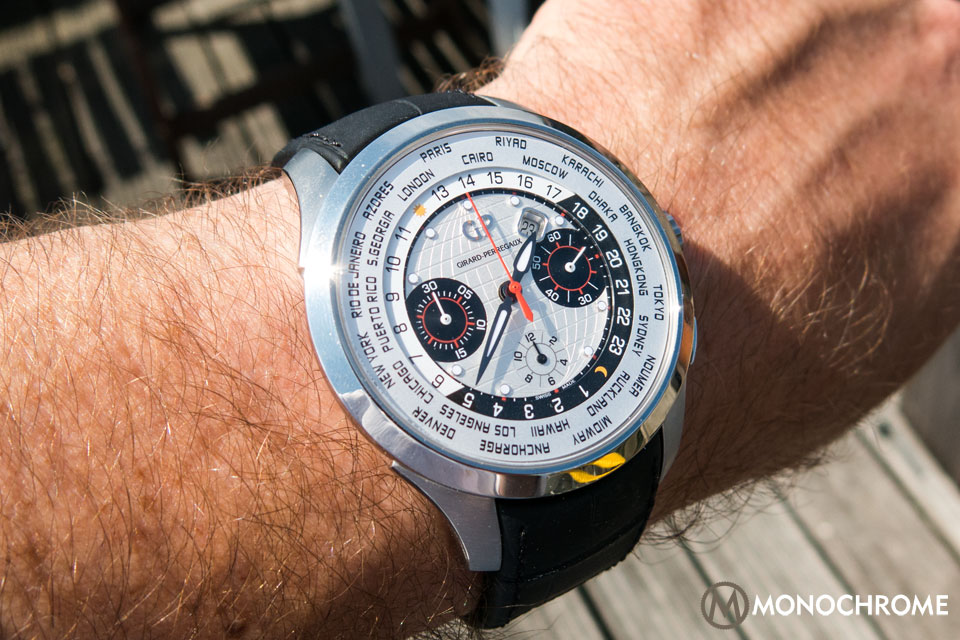
Overall appearance
The new Traveler WW.TC sits comfortable on the wrist. While it isn’t the smallest watch, with a diameter of 44mm, the lugs are fairly short and the shaped rubber/leather strap comfortably hughes the wrist. It has a sporty look, a bit rugged, manly, but also enough class so it can easily be combined with a suit and shirt.
The model that we got for this review is not shown on the Girard-Perregaux website. It is the white dial version, although “ours” has two black sub dials and would qualify as a “panda” version. The online catalog at GP’s website (see here) only shows two steel versions – one with a white dial and another with a black dial – and one titanium version with two beige colored sub dials. Not sure if this color combination will be available on the market, but we do hope so! The panda dial version, which was available for the previous WW.TC models, has always been one of our favorites, because of a certain playfulness.
All together the WW.TC is an impressive timepiece, both in size as in looks and style.
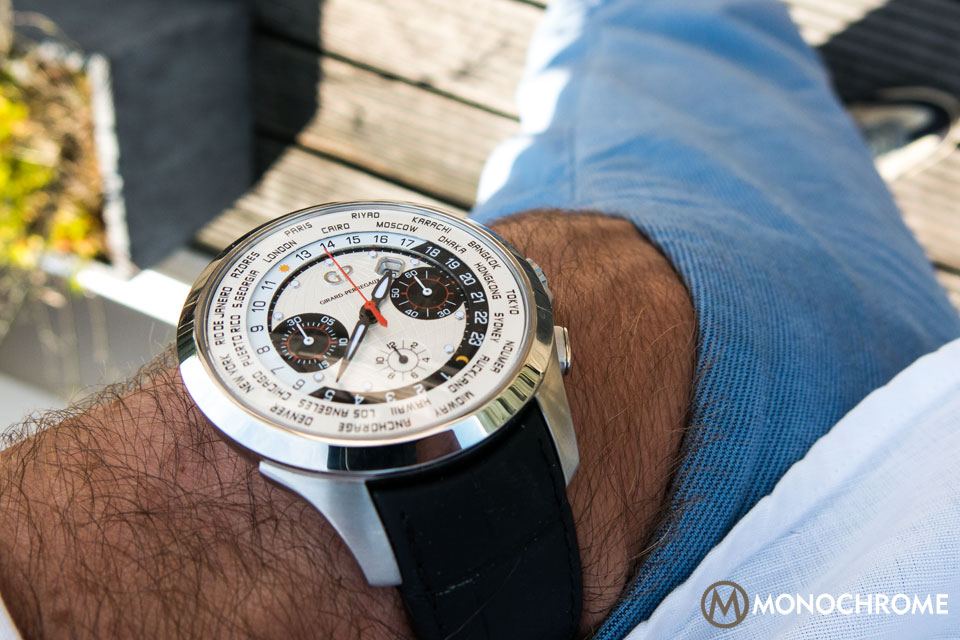
Features
The main feature on all WW.TC pieces is of course the world timer. A world timer is in our opinion the most usable of all complications! Not just for traveling, no, it’s very convenient for daily use. Through internet we know people from all around the world, whether they are business contacts, friends or relatives. Only with a true world timer it is easy to see the local time for each of those persons, in a glimpse!
The Traveler WW.TC is not “just” a perfect tool for the modern person, it also looks great with pretty much every outfit, except black tie. Its chronograph adds a lot of its sporty looks, however the entire design, the case, the strap and even the folding clasp all contribute to those looks. Moreover, these sporty looks are more than just looks, as the WW.TC is water proof to a depth of 100 m / 330 ft. so you can use it to measure elapsed time and you can wear it while swimming. These depth rating do not qualify for serious deep sea diving.
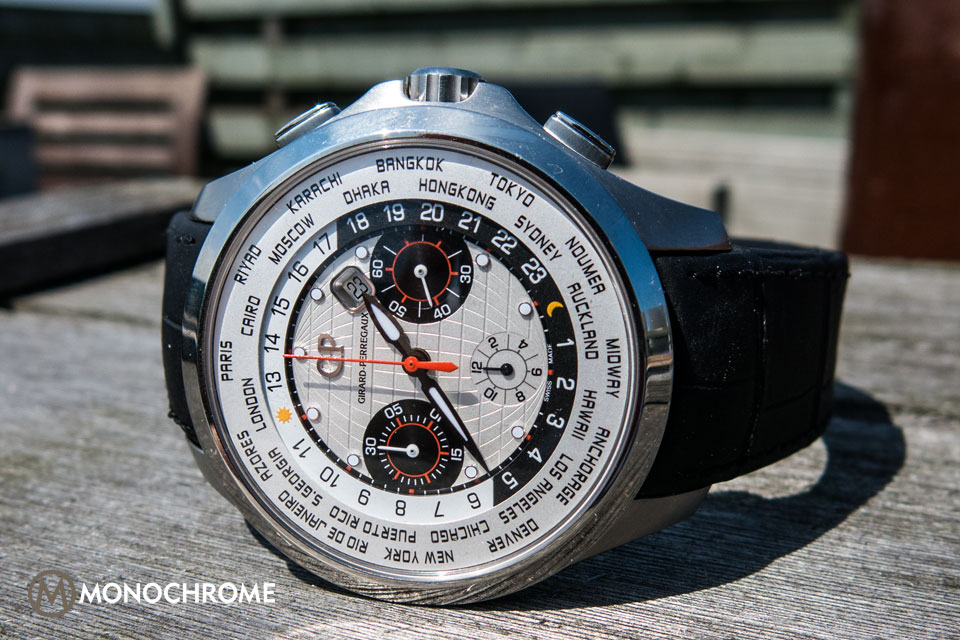
The pusher at the 2 o’clock position is for starting and stopping the chronograph; the pusher at 4 o’clock resets all chronograph hands to zero. Winding, adjusting the time, adjusting the date and adjusting the world timer is all done through the crown. And that’s new, because turning the disk with 24 cities had to be done with the crown at 9 o’clock on all previous WW.TC models. Now-a-days that ring can be rotated by the crown at 3 o’clock.
And what about Daylight Saving Time?
Daylight Saving Time or short DST is the practice of advancing clocks during the lighter months of the year, so that evenings have more daylight and mornings have less. Typically clocks (and wristwatches) are adjusted forward one hour near the start of spring and are adjusted backward in autumn. The general idea is that this saves energy, because with the natural light it reduces the necessity of (electric) lighting during the evenings.
The modern idea of daylight saving was first proposed in 1895 and it was first implemented by Germany and Austria-Hungary starting in 1916. Many countries followed this example, including the United States, where DST use expanded after the 1970’s energy crisis. It has been widely used in North America and Europe since then. DST is not used in all countries around the globe and mainly restricted to Europe, the USA, parts of Australia, New Zealand, parts of Brazil, Chile and several other countries.
Like most world timers, the Girard-Perregaux Traveler WW.TC does not automatically adjust time for DST, so a wearer should be aware of this.
More information about DST can be found on Wikipedia.
Dial/hands
The dial comprises a central dial – with engraved meridians and parallels, almost like a globe without continents – surrounded by a black/white 24-hour ring, which is again surrounded by a rotatable disk with 24 cities from the main time zones of the world. I say main time zones, because there are also several time zones which differ by 30 minutes (Iran, India and Afganistan among others) or even by 15 minutes (Nepal).
The “panda” version we got for review has two black sub dials, with some red accents, for the 30-minutes register (at 9 o’clock) and the running seconds (at 3 o’clock). The 12-hours chronograph registers, at the 6 o’clock position, is in the white/silver color of the rest of the dial. Like on all WW.TC models, the date window is positioned between 1 and 2 o’clock. At the 12 o’clock position is the brand’s logo (an applied GP logo) and name. At all hours, except 3, 6 and 9 o’clock, are luminescent round hour makers.
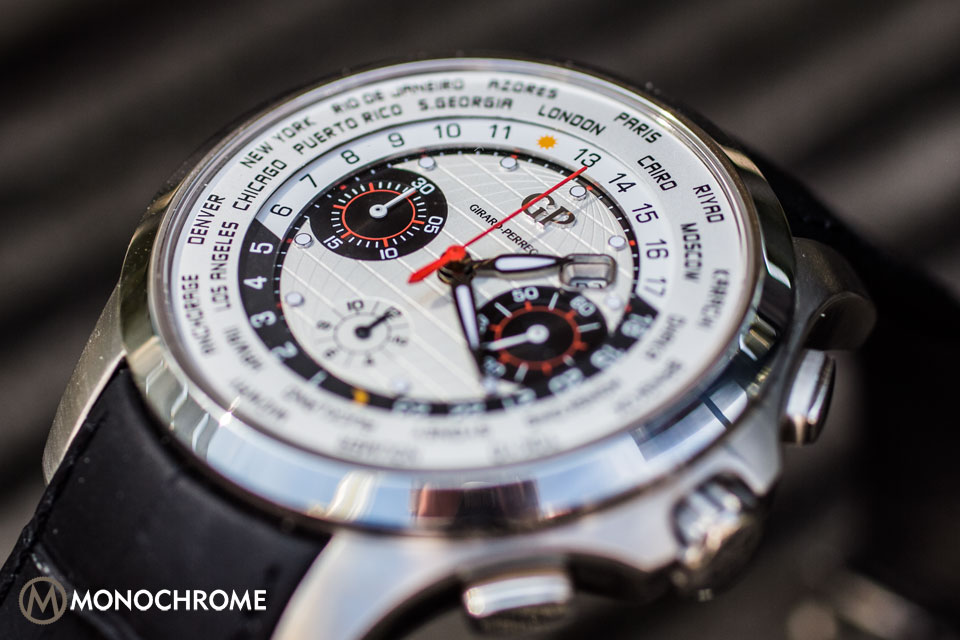
Case/strap
The stainless steel case, which is 44 mm in diameter, has a domed sapphire front crystal and the smaller sapphire crystal in the case back that reveals the automatically wound caliber GP3300-0084. On the right-hand side of the case are two pushers, to operate the chronograph, and a crown. The new Travel WW.TC has undergone quite some design changes, compared to the previous series that was made from 2000 until 2012. One of the changes is already mentioned, as it is probably the most notable design change: the crown on the left side of the case is no more. Now all functions are operated by the crown on the right side and that crown is now protected by crown guards.
Not only the crown guards and different pushers are redesigned, but also the lugs, the bezel and the case back. The polished steel bezel is flatter and wider than on the previous model and is sloping gradually downwards. The rest of the case and lugs are satin finished, which gives a great contrast with the polished bezel.
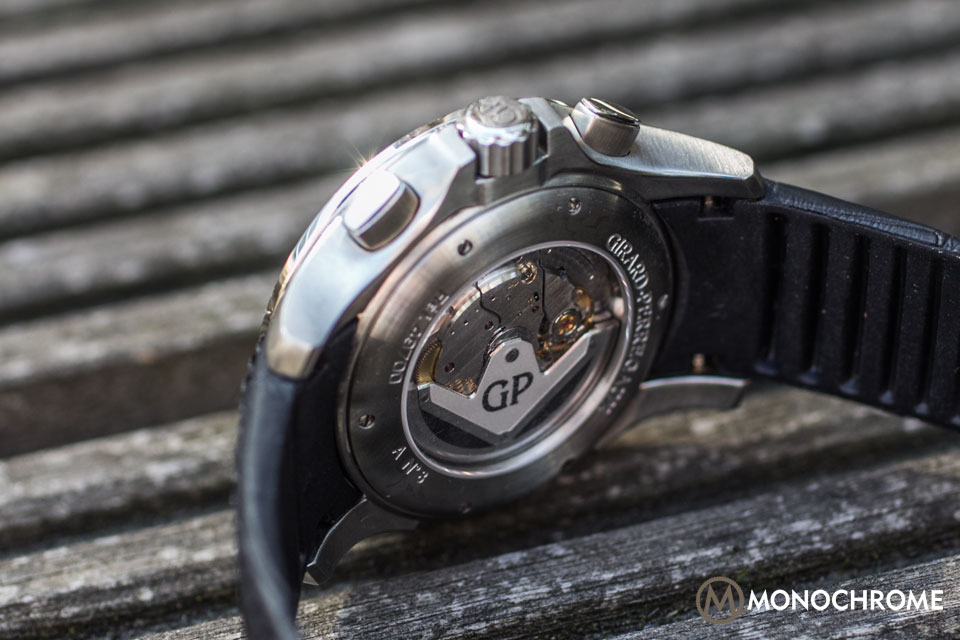
The lugs are very elegantly shaped and somehow ‘hide’ under the wide bezel. Actually the entire case, from top to bottom, slightly slopes inwards, so the bezel remains the widest part of the case, except for the pushers, crown and crown guard.
The lugs are also shorter, which makes the larger case (increased by 1 mm) feels nothing larger and maybe even smaller on the wrist as the previous model. This is also due to the new rubber/leather strap. I know, this sounds strange, however Girard-Perregaux choose to equip the Traveller WW.TC with a shaped rubber strap that has an alligator leather upholstery. The looks of an alligator strap and the comfort of a rubber strap. Well done!
Movement
While almost nothing remained ‘untouched’ in the re-design, actually only the movement wasn’t changed. Inside ticks Girard-Perregaux’s caliber GP3300-0084. The base caliber is GP3300, a beautiful and thin, automatically wound movement that is used in many GP models. Atop that workhorse, is a chronograph module.
GP3300-0084 self-winding movement
- Diameter: 30.00 mm
- Frequency: 28,800 alt / h ( 4 Hz )
- Jewels: 63
- Power reserve: min. 46 hours
- Functions: hours, minutes, small seconds, world time with day/night indicator, chronograph, date
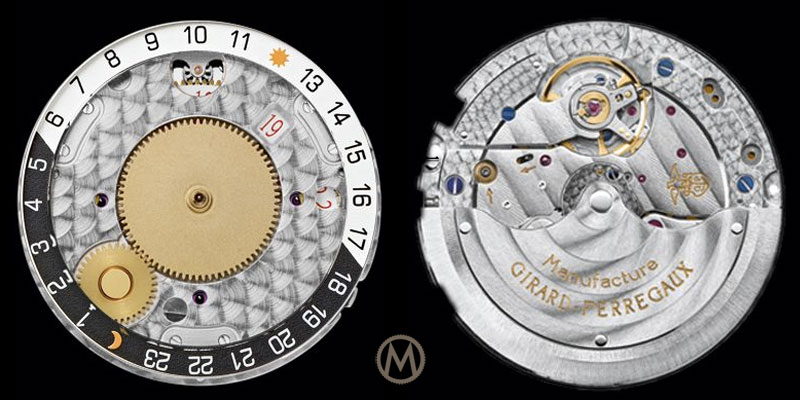
The movement is generously finished: circular spotting on the main plate, Côte de Genève on the bridges and circular Côte de Genève on the winding mass. The screws are heat-blued and the edges of the bridges are beveled and polished. That’s what we may expect from a Haute Horlogerie manufacture like Girard-Perregaux and they have delivered accordingly.
The verdict – pros and cons
First of all, we LOVE the new design of Girard-Perregaux’s Traveller WW.TC. It is a mix of classy, stylish, sporty and manly and makes a perfect companion for pretty much every occasion; the new Traveller WW.TC is a perfect all-rounder. And it features the most useful of all complications: the worldtimer.
These are the biggest changes, compared to the older version:
- the entire case, bezel, crown guard and pushers
- much shorter lugs and a shaped rubber/leather strap
- the dial, used to be flat, now with engraved globe meridians and parallels and luminescent round hour markers
- new hands: the old leaf shaped hands are replaced by dagger shaped hands
The entire review is actually a long list of “pro’s” so what’s there ot nag about. Not much actually. OK, personally I wouldn’t mind if it had a slightly smaller diameter and a slightly thinner bezel. It would also be an enhancement if Girard-Perregaux had chosen to upgrade from the GP3300 base caliber to the GP4500 base caliber and adding 8 hours of power reserve. But honestly, the Traveller WW.TC is a perfect all-round watch, it fits great on the wrist, it looks great, it runs great and its worldtimer complication is something that we actually use a lot.
The Girard-Perregaux Traveller WW.TC is available at official retailers for € 14.900 Euro (including 21% VAT).
Enjoy the rest of the photos! More information can be found on the Girard-Perregaux website.

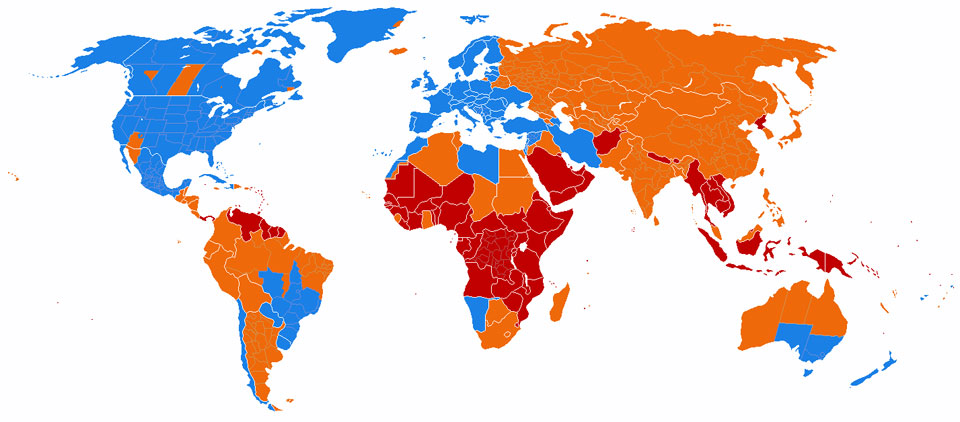

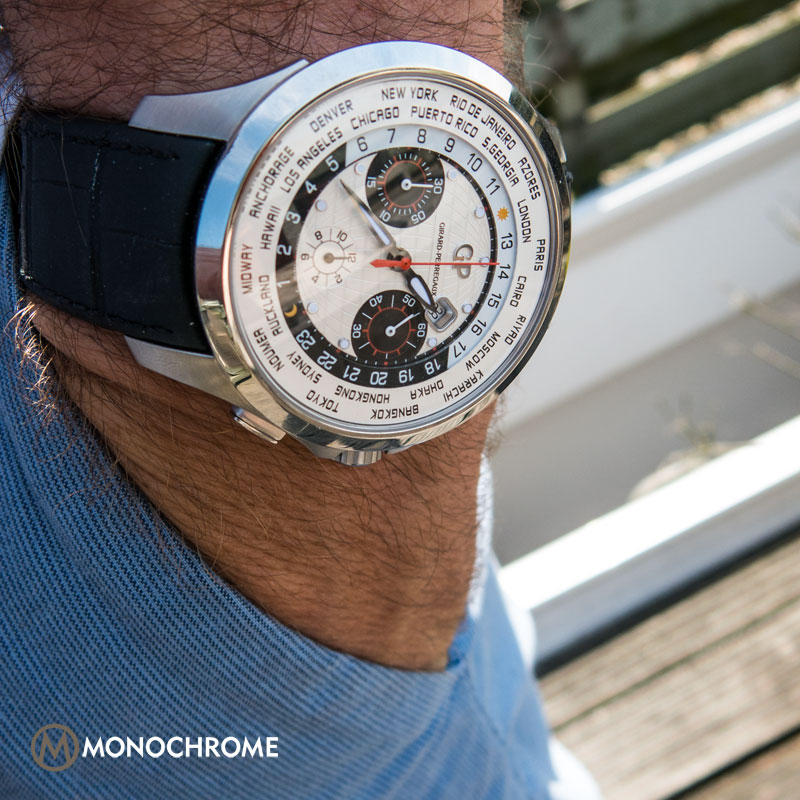
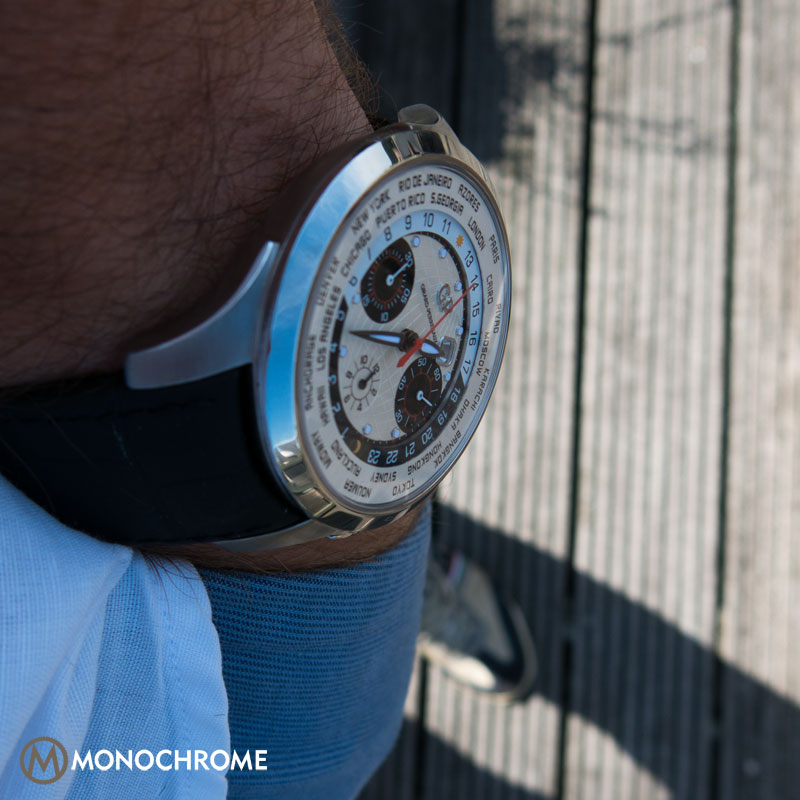
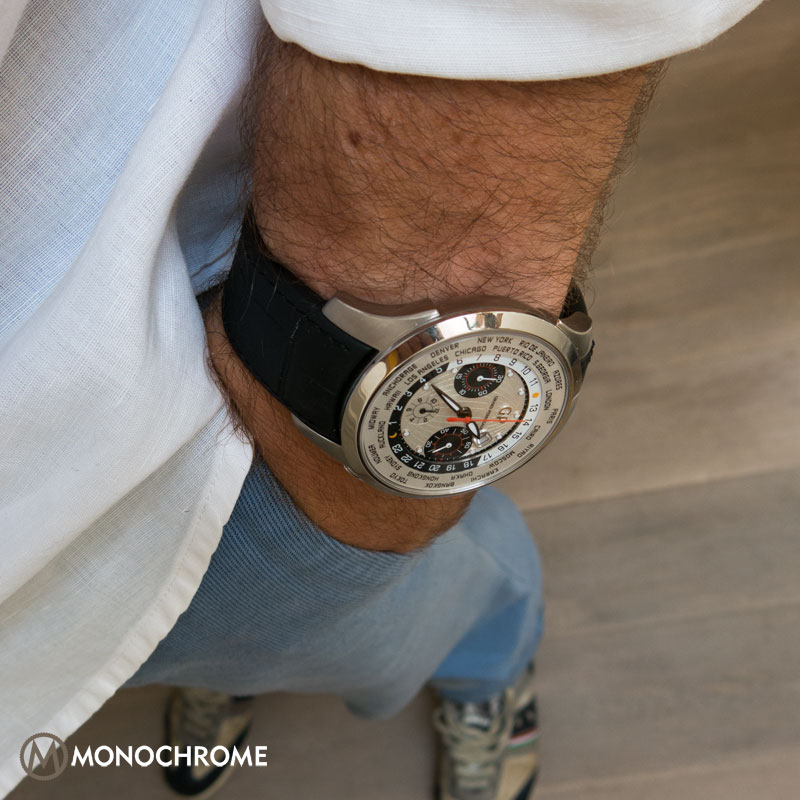
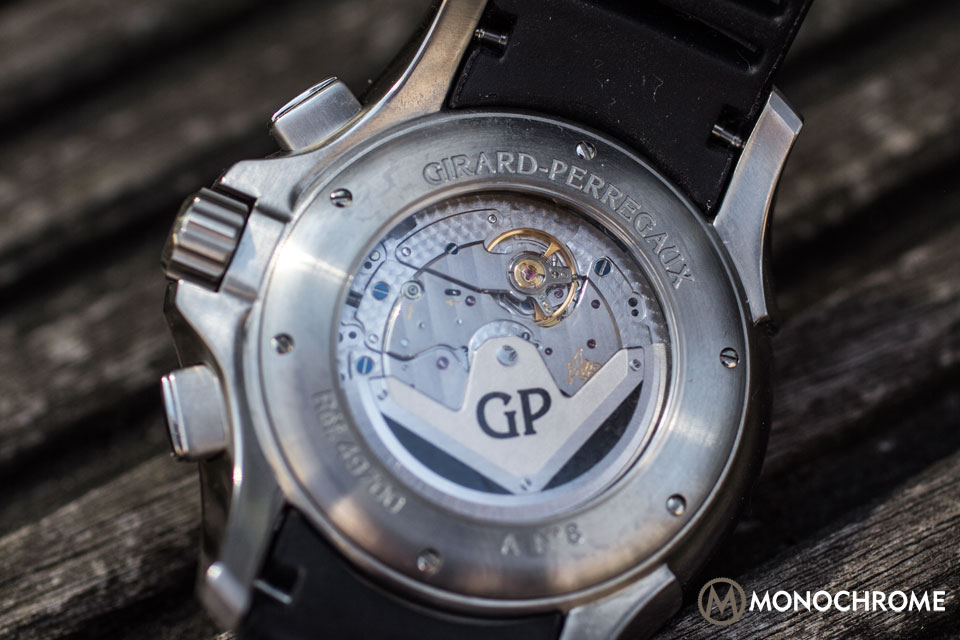

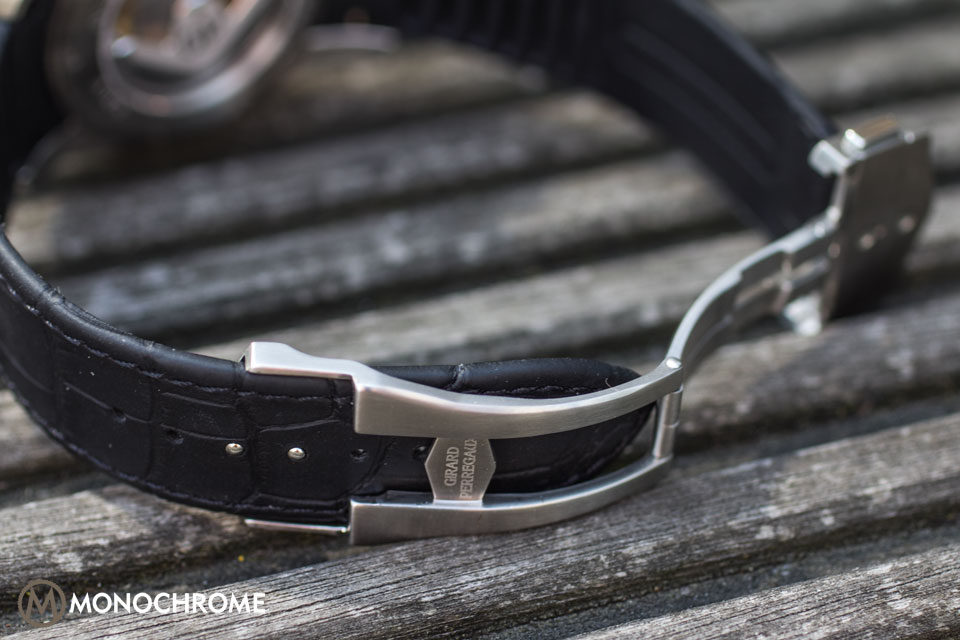
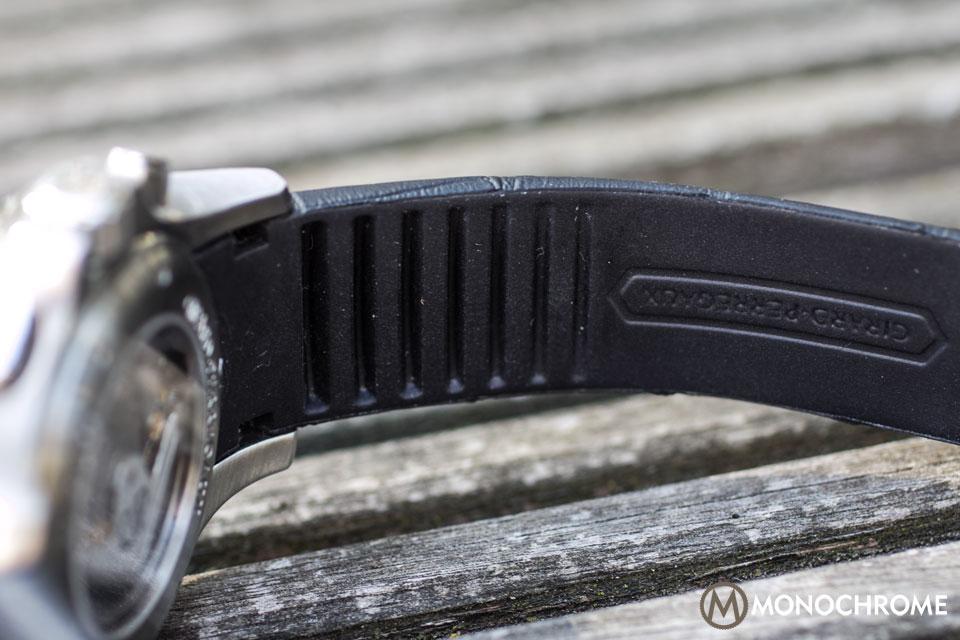
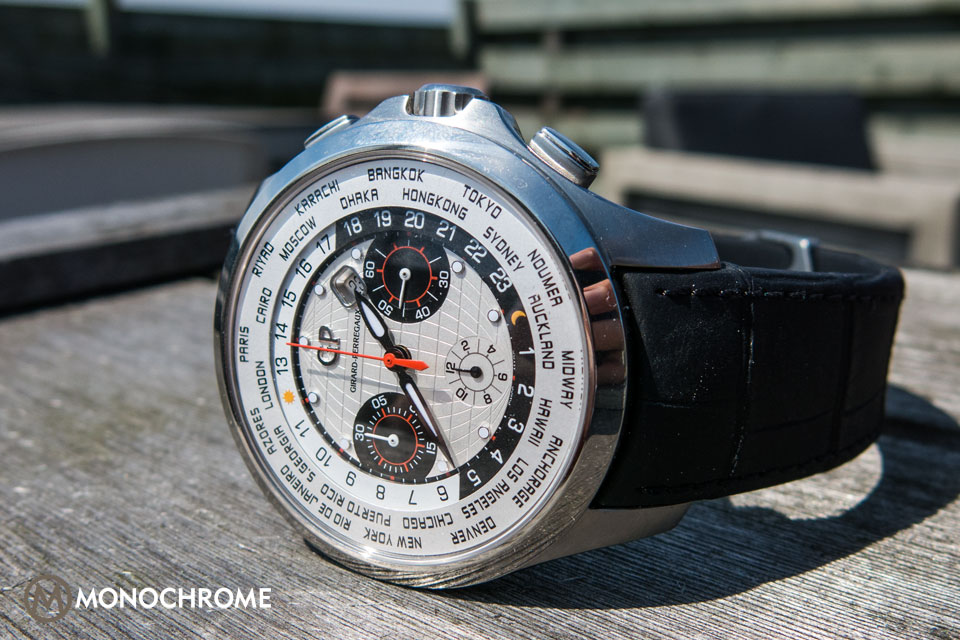

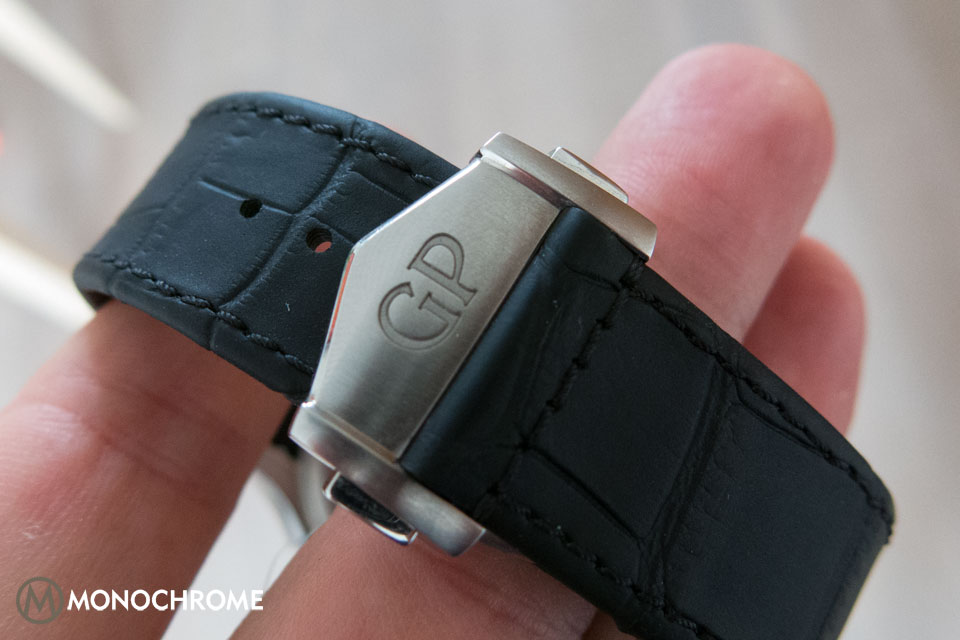
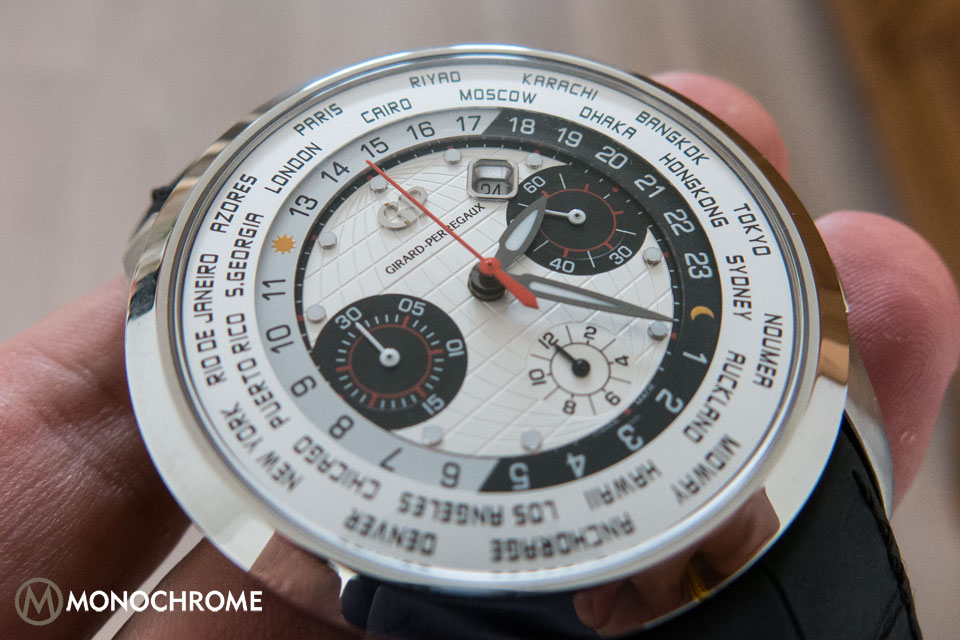

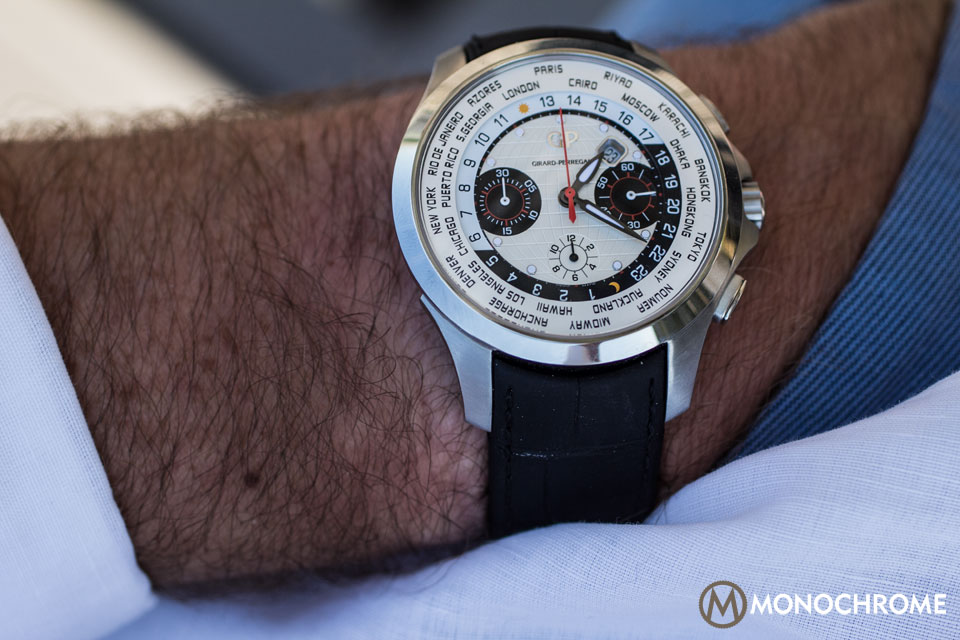

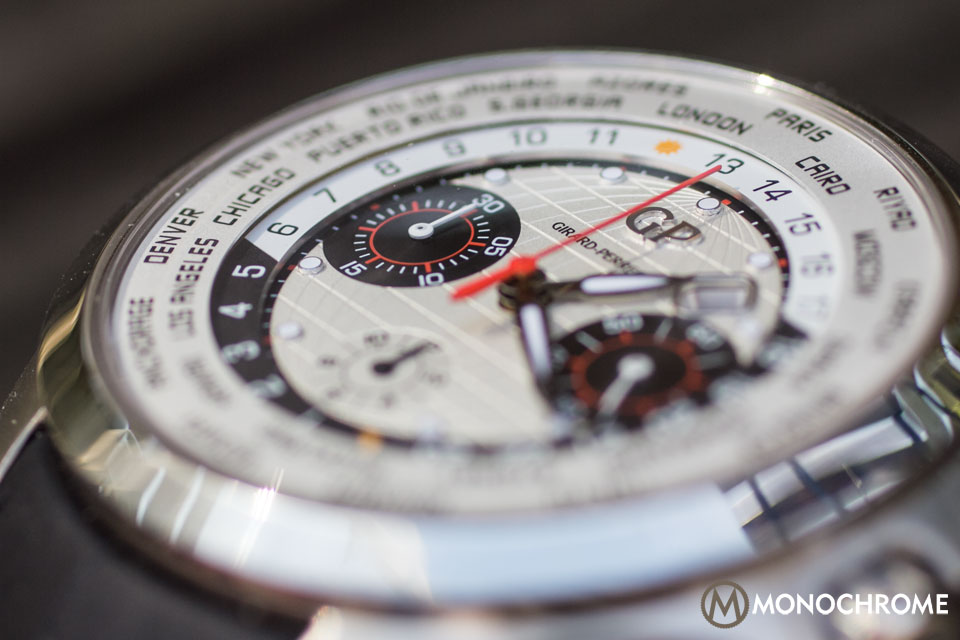

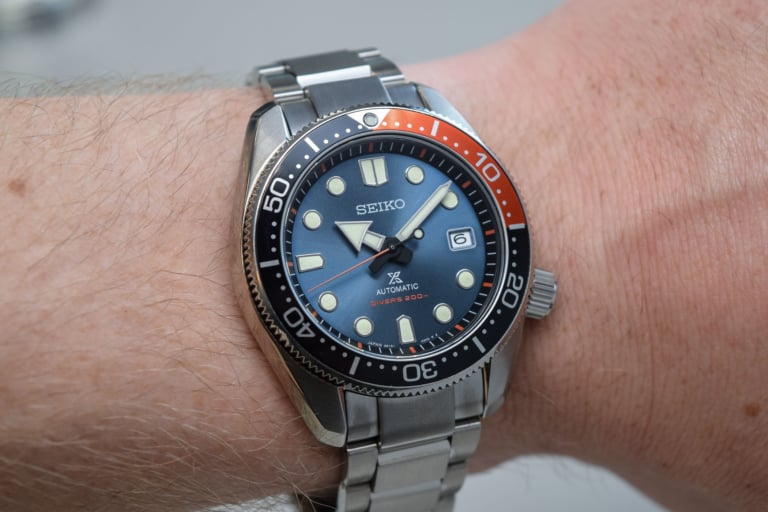
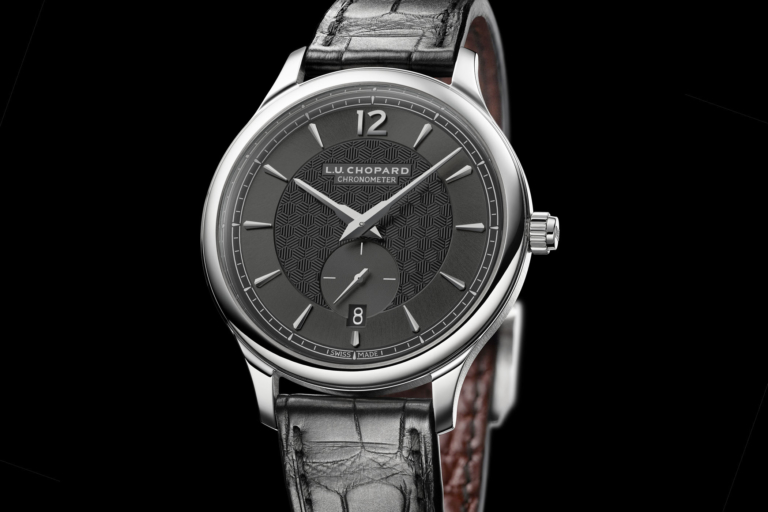
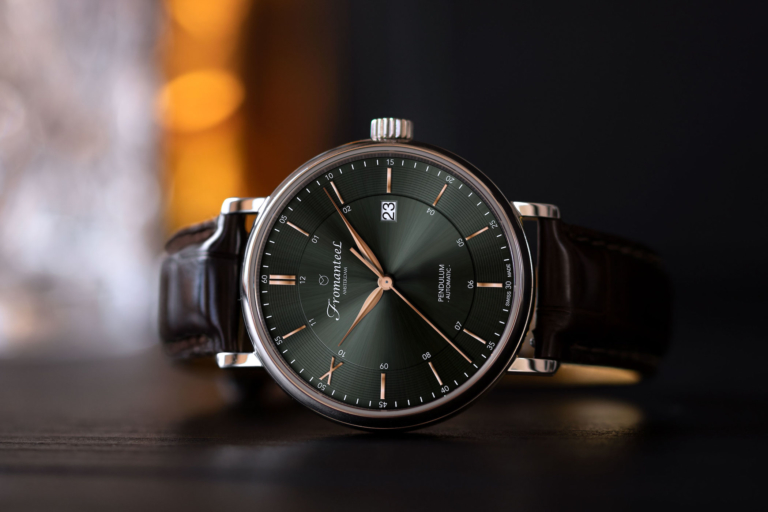
1 response
This new Traveller collection is one of the smart time pieces. thanks for updating such quality blog.